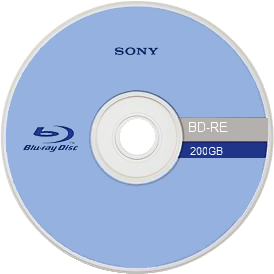Blu-ray
Blu-ray is an optical disc format designed to enable recording, rewriting, and playback of high-definition (HD) video, as well as storing large amounts of data. The format offers more than five times the storage capacity of traditional DVDs and can hold up to 25 GB on a single-layer disc and 50 GB on a dual-layer disc. This increased capacity is essential for HD video and audio, providing consumers with an enhanced viewing experience with improved picture and sound quality.
History[edit | edit source]
The Blu-ray format was developed by the Blu-ray Disc Association, a group representing makers of consumer electronics, computer hardware, and motion pictures. The format was officially announced in 2002, with the first consumer devices arriving in stores in 2006. The name "Blu-ray" refers to the blue laser used to read the disc, which allows information to be stored at a greater density than is possible with the longer-wavelength red laser used for DVDs.
Technical Specifications[edit | edit source]
Blu-ray discs are made up of several layers, including a hard-coating layer designed to protect the disc from scratches and other types of damage. The format uses a 405 nm blue-violet laser diode, differing from the 650 nm red laser used for DVDs. This shorter wavelength allows for smaller data pits and a higher capacity than DVDs, which is why Blu-ray discs can hold much more data.
Video and Audio[edit | edit source]
Blu-ray supports various video codecs, including MPEG-2, MPEG-4 AVC (H.264), and SMPTE VC-1. The format is capable of storing full HD 1080p video at high bit rates, which results in clearer, more detailed images. For audio, Blu-ray supports multiple audio formats, including Dolby Digital, DTS, and uncompressed linear PCM, providing high-quality sound to accompany the high-definition video.
Blu-ray vs. HD DVD[edit | edit source]
The introduction of Blu-ray led to a format war with HD DVD, another high-definition optical disc format. Both formats were released around the same time, but Blu-ray ultimately won out, thanks in part to its larger storage capacity and support from major film studios and technology companies. HD DVD was officially discontinued in 2008.
Future of Blu-ray[edit | edit source]
With the advent of 4K and Ultra HD Blu-ray, the Blu-ray format has evolved to meet the demands of ultra-high-definition content. Ultra HD Blu-ray discs can store up to 100 GB of data and support HDR (High Dynamic Range), providing an even better picture quality than standard Blu-ray.
Despite the rise of streaming services, Blu-ray remains popular among enthusiasts and consumers who prefer physical media for its quality and reliability. However, the format faces challenges from digital distribution, which offers convenience and accessibility.
See Also[edit | edit source]
Search WikiMD
Ad.Tired of being Overweight? Try W8MD's physician weight loss program.
Semaglutide (Ozempic / Wegovy and Tirzepatide (Mounjaro / Zepbound) available.
Advertise on WikiMD
|
WikiMD's Wellness Encyclopedia |
| Let Food Be Thy Medicine Medicine Thy Food - Hippocrates |
Translate this page: - East Asian
中文,
日本,
한국어,
South Asian
हिन्दी,
தமிழ்,
తెలుగు,
Urdu,
ಕನ್ನಡ,
Southeast Asian
Indonesian,
Vietnamese,
Thai,
မြန်မာဘာသာ,
বাংলা
European
español,
Deutsch,
français,
Greek,
português do Brasil,
polski,
română,
русский,
Nederlands,
norsk,
svenska,
suomi,
Italian
Middle Eastern & African
عربى,
Turkish,
Persian,
Hebrew,
Afrikaans,
isiZulu,
Kiswahili,
Other
Bulgarian,
Hungarian,
Czech,
Swedish,
മലയാളം,
मराठी,
ਪੰਜਾਬੀ,
ગુજરાતી,
Portuguese,
Ukrainian
Medical Disclaimer: WikiMD is not a substitute for professional medical advice. The information on WikiMD is provided as an information resource only, may be incorrect, outdated or misleading, and is not to be used or relied on for any diagnostic or treatment purposes. Please consult your health care provider before making any healthcare decisions or for guidance about a specific medical condition. WikiMD expressly disclaims responsibility, and shall have no liability, for any damages, loss, injury, or liability whatsoever suffered as a result of your reliance on the information contained in this site. By visiting this site you agree to the foregoing terms and conditions, which may from time to time be changed or supplemented by WikiMD. If you do not agree to the foregoing terms and conditions, you should not enter or use this site. See full disclaimer.
Credits:Most images are courtesy of Wikimedia commons, and templates, categories Wikipedia, licensed under CC BY SA or similar.
Contributors: Prab R. Tumpati, MD






